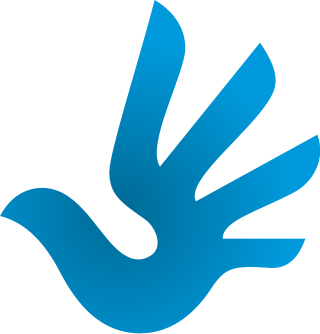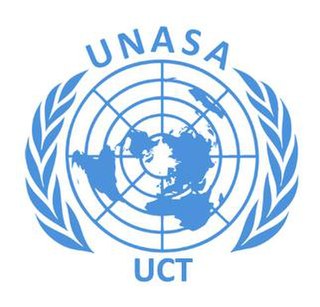Related Research Articles

Extreme poverty, deep poverty, abject poverty, absolute poverty, destitution, or penury, is the most severe type of poverty, defined by the United Nations (UN) as "a condition characterized by severe deprivation of basic human needs, including food, safe drinking water, sanitation facilities, health, shelter, education and information. It depends not only on income but also on access to services". Historically, other definitions have been proposed within the United Nations.

The United Nations Environment Programme (UNEP) is responsible for coordinating responses to environmental issues within the United Nations system. It was established by Maurice Strong, its first director, after the United Nations Conference on the Human Environment in Stockholm in June 1972. Its mandate is to provide leadership, deliver science and develop solutions on a wide range of issues, including climate change, the management of marine and terrestrial ecosystems, and green economic development. The organization also develops international environmental agreements; publishes and promotes environmental science and helps national governments achieve environmental targets.

The United Nations Foundation is a charitable organization headquartered in Washington, DC, that supports the United Nations and its activities. It was established in 1998 with a $1 billion gift to the United Nations by philanthropist Ted Turner, who believed the UN was crucial for addressing the world's problems. Originally primarily a grantmaker, the UN Foundation has evolved into a strategic partner to the UN, mobilizing support to advance the Sustainable Development Goals (SDGs), and help the UN address issues such as climate change, global health, gender equality, human rights, data and technology, peace, and humanitarian responses. The UN Foundation's main work occurs through building public-private partnerships, communities, initiatives, campaigns, and alliances to broaden support for the UN and solve global problems. The UN Foundation has helped build awareness and advocate for action on, among others, antimicrobial resistance, regional action on climate change, local implementation of the SDGs, as well as global campaigns such as Nothing But Nets against malaria, the Measles & Rubella Initiative, the Clean Cooking Alliance, Girl Up, Shot@Life, and the Digital Impact Alliance, among others. In March 2020, the UN Foundation was also a key founder of the COVID-19 Solidarity Response Fund on behalf of the World Health Organization (WHO), helping to raise over $200 million USD within the first six weeks to support the global response to the COVID-19 pandemic.

The Millennium Development Goals (MDGs) were eight international development goals for the year 2015 that had been established following the Millennium Summit of the United Nations in 2000, following the adoption of the United Nations Millennium Declaration. These were based on the OECD DAC International Development Goals agreed by Development Ministers in the "Shaping the 21st Century Strategy". The Sustainable Development Goals (SDGs) succeeded the MDGs in 2016.

Human Rights Day is celebrated annually around the world on 10 December every year.

On 8 September 2000, following a three-day Millennium Summit of world leaders gathered in New York at the headquarters of the United Nations, the UN General Assembly adopted some 60 goals regarding peace; development; environment; human rights; the vulnerable, hungry, and poor; Africa; and the United Nations which is called Millennium Declaration . A follow-up outcome of the resolution was passed by the General Assembly on 14 December 2000 to guide its implementation. Progress on implementation of the Declaration was reviewed at the 2005 World Summit of leaders. The Declaration includes 8 chapters and 32 paragraphs.

Poverty reduction, poverty relief, or poverty alleviation, is a set of measures, both economic and humanitarian, that are intended to permanently lift people out of poverty.

The International Day of Peace, also officially known as World Peace Day, is a United Nations-sanctioned holiday observed annually on 21 September. It is dedicated to world peace, and specifically the absence of war and violence, such as might be occasioned by a temporary ceasefire in a combat zone for humanitarian aid access. The day was first celebrated in 1981 and is kept by many nations, political groups, military groups, and people.
The Vienna Declaration and Programme of Action (VDPA) is a human rights declaration adopted by consensus at the World Conference on Human Rights on 25 June 1993 in Vienna, Austria. The position of United Nations High Commissioner for Human Rights was recommended by this Declaration and subsequently created by General Assembly Resolution 48/141.
Human rights education (HRE) is the learning process that seeks to build up knowledge, values, and proficiency in the rights that each person is entitled to. This education teaches students to examine their own experiences from a point of view that enables them to integrate these concepts into their values, decision-making, and daily situations. According to Amnesty International, HRE is a way to empower people, training them so their skills and behaviors will promote dignity and equality within their communities, societies, and throughout the world.

International Youth Day (IYD) is an awareness day designated by the United Nations. The purpose of the day is to draw attention to a given set of cultural and legal issues surrounding youth. The first IYD was observed on 12 August, 2000.

The International Volunteer Day for Economic and Social Development, more commonly referred to as International Volunteer Day (IVD), is an international observance mandated by the UN General Assembly in 1985. It offers an opportunity for volunteer-involving organizations and individual volunteers to promote volunteerism, encourage governments to support volunteer efforts, and recognize volunteer contributions to the achievement of the Sustainable Development Goals (SDGs) at local, national, and international levels.
The Universal Declaration on Animal Welfare (UDAW) is a proposed inter-governmental agreement to recognise that animals are sentient, to prevent cruelty and reduce suffering, and to promote standards on the welfare of animals such as farm animals, companion animals, animals in scientific research, draught animals, wildlife and animals in recreation.
In December 2009, the United Nations General Assembly adopted resolution 64/134 proclaiming the year commencing 12 August 2010 as the International Year of Youth.

The United Nations Association of South Africa University of Cape Town is an official chapter of the United Nations Association of South Africa (UNASA) and affiliated to the World Federation of United Nations Associations. UNASA UCT is a registered political society at the University of Cape Town. The aim of the society is to work in collaboration with various stakeholders in South Africa to promote and support the goals, vision and principles of the UN and its agencies.
The International Day of Happiness is celebrated throughout the world on 20 March. It was established by the United Nations General Assembly on 28 June 2012.

The Sustainable Development Goals (SDGs) or Global Goals are a collection of 17 interlinked objectives designed to serve as a "shared blueprint for peace and prosperity for people and the planet, now and into the future". The goals are: No poverty, zero hunger, good health and well-being, quality education, gender equality, clean water and sanitation, affordable and clean energy, decent work and economic growth, industry, innovation and infrastructure, Reduced Inequality, Sustainable Cities and Communities, Responsible Consumption and Production, Climate Action, Life Below Water, Life On Land, Peace, Justice, and Strong Institutions, Partnerships for the Goals. The SDGs emphasize the interconnected environmental, social and economic aspects of sustainable development by putting sustainability at their center.
Extreme poverty is defined as living on less than US$2.50 purchasing power parity. Uganda has made significant progress in eradicating poverty and achieved the first millennium development goal of halving the number of people in extreme poverty. Uganda was listed as the 9th most successful country in Africa as regards poverty eradication. The percentage of Ugandans living in absolute poverty has been on a substantial decline, and the finance ministry in the country projected that the extreme poverty level will be reduced to 10% in the future. This success has been attributed to the deliberate efforts to combat poverty in the country by numerous national strategies that are explained below.
Baháʼu'lláh, the prophet-founder of the Baháʼí Faith, called for global agreement on human rights protection nearly eighty years before the adoption of the Universal Declaration of Human Rights (UDHR) in 1948. He taught that "an equal standard of human rights must be recognized and adopted.” Baháʼu'lláh called for governments to protect the human rights of their populations and to ensure their welfare. To safeguard human rights, Bahá'u'lláh urged global leaders to establish a world commonwealth that would include a system of collective security to protect populations against tyranny and oppression.
Sustainable Livelihood emerges at the intersection of development and environmental studies to offer a new way to think about work, production and distribution. Specifically, the work of vulnerable populations are discussed in this concept to build a sustainable future where inequality is eliminated in households.The term reflects a concern with extending the focus of poverty studies beyond the physical manifestations of poverty to include also vulnerability and social exclusion.
References
- ↑ "International Human Solidarity Day". DISD.
- ↑ "International Human Solidarity Day 2019 | South African Government". www.gov.za.
- 1 2 Nations, United. "International Human Solidarity Day". United Nations.
- ↑ "International Human Solidarity Day 2019".
- ↑ "International Human Solidarity Day is observed on 20 December". December 20, 2019.
- ↑ "International Human Solidarity Day". timeanddate.com. Retrieved 15 May 2020.
- ↑ "OHCHR | International Day for Human Solidarity". www.ohchr.org.
- ↑ "International Human Solidarity Day 2019: All you need to know". Hindustan Times. 20 December 2019. Retrieved 21 April 2020.
- ↑ "Human Solidarity Day today". www.thenews.com.pk.
- ↑ "UN Secretary-General's message on the International Human Solidarity Day (20 December)". UNMISS. December 20, 2016.